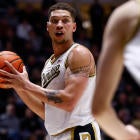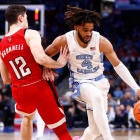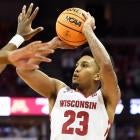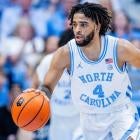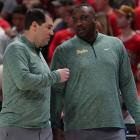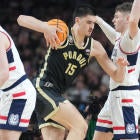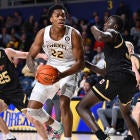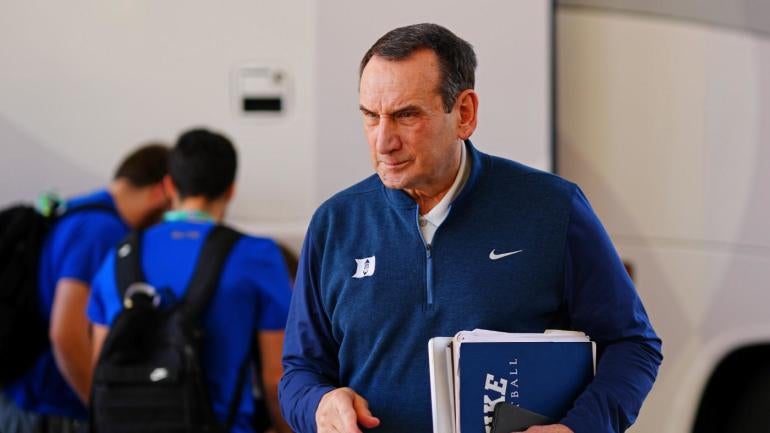
NEW ORLEANS — The most illuminating version of Mike Krzyzewski is the one only a few people ever get to see: Coach K wide-eyed at 3:24 in the morning. Wounded pizza crusts on the plate, a Diet Coke in arm's reach, the Duke head coach with his assistants poring through game after game after game. Tedious work. But, for Krzyzewski, necessary. The process repeats itself. It must.
"I've always looked at a game wasn't over until you analyze that," Krzyzewski said Thursday, his Duke team in preparation for a mammoth showdown vs. blood rival North Carolina in the Final Four on Saturday. "And we're able to put a tape together, feedback for your team the next day. And then once that was given, that game was put on the shelf and you move forward, and it's just a routine of what a game is and then how do you prepare for the for the next one."
That august image of Coach K flares in contrast with the gritty, quiet reality of what built that image in the first place. At his core, Krzyzewski is a wicked competitor, someone hellbent on dismantling his opponents, a man who has processes, habits and routines that might seem to border on psychopathic for anyone in search of standard work/life balance — or a normal sleep schedule.
"At 75, he still wants to fight everyone this week," Notre Dame coach Mike Brey, a former Duke assistant, told CBS Sports.
It's this reason, beyond all others, that Krzyzewski has successfully coached to the age of 75, built up arguably the greatest career in basketball coaching — ever, at any level — and has Duke back in the Final Four. It's Krzyzewski's 13th time bringing his program to the biggest stage in college basketball. That's a record. His record. There's a healthy chance it's never broken.
"He's relentless," Duke associate head coach Jon Scheyer told CBS Sports. "Like, he's a machine."
The following calculation is an approximation, and almost certainly an undershoot. To get a sense of how much time Krzyzewski has lived by reliving his own teams' games and/or scouting opponents, a conservatively fair estimate is four hours of postgame film review per game (according to former Duke assistants who were interviewed for this story). Add in at least another hour — at LEAST — per game that Krzyzewski watches on his own time, and the number comes out to about 8,000 hours of his life that's been spent watching tape. Minimally. That equates to 333 full days. In reality, when you stack up all the film sessions together, it's plausible that at least one full year of Mike Krzyzewski's 75 voyages around the sun has been dedicated to watching and scouting basketball tape. That doesn't account for coaching in games, practices, writing practice plans, travel, any of that.
"To me, it's kind of superhuman," Chris Collins told CBS Sports. Collins played at Duke from 1992-96, then spent 13 seasons as an assistant before getting the Northwestern job in 2013. "In those kind of film sessions and an interacting with the staff, that where's I grew to appreciate that burning fire inside of him to compete to win."
To get a clean understanding of how this 75-year-old has made it one final time to the biggest stage in the sport, there's probably no better way of crystallizing it than by looking at the man as he's lived most of his coaching life.
Sitting in a room and watching the tape.
Just a man and his beloved film. A coaching sanctuary.
"If I call him, nine out of 10 times it's, 'Oh, I'm just watching tape,'" longtime Duke sports information director Jon Jackson said.
Getting to more than 1,200 career wins, reaching 13 Final Fours, winning five national championships, emerging victorious in more than 100 NCAA Tournament games … these things don't happen purely on the shoulders of good fortune by coaching great players. Krzyzewski's a madman for film. True hoops sicko stuff.
"His energy is ridiculous," former assistant and Duke player Steve Wojciechowski said. "I've been really fortunate in my travels to be around what I would consider elite competitors, and I'm not sure anyone's matched Coach in that category, whether it's players or other coaches. It's not just his competitiveness, but his ability to day in, day out execute personally his own values and try to get the people around him to do the same is unfathomable. Unfathomable."
Krzyzewski adopted the method from his legendary college coach, Bob Knight. At West Point they had a room with no windows – in effect, a bunker. Coaches would sit in the dark, closed off from society. K carried on the tradition when he got the Army job in 1976 and hasn't changed much since. A game ends and, as soon as possible, he craves to relive what he just coached through. Rewatch the game once, maybe twice, maybe even three times. Move on to scout upcoming opponents. Squeeze it all in as quickly, but methodically, as possible.
"It's a borderline unhealthy, obsessive nature of how he does this," Brey said. "It's going to be like, you want to know why he's this good? That's why."
Every game Krzyzewski coaches, there is an internal dialogue playing along to a movie in his head. He's keeping track of what is happening in real time, making mental notes, then wants to confirm or negate his impressions and biases after the game. To wait until the morning or the next afternoon is to go against what his brain his telling him to do. He processes and curates the message he wants to tell his team immediately, the next day. There needs to be evidence to what he's saying. The message is always authentic.
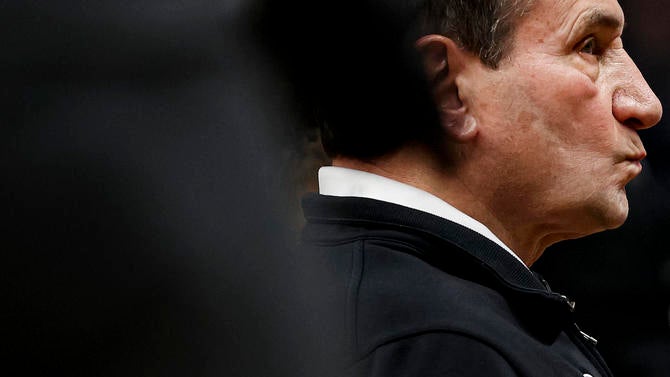
"I could never imagine how disciplined and how much he works when I got on staff," Scheyer said. "I knew as a player that he prepares as well as anybody, but you're not able to visualize that or to see it firsthand. And so when I was going back on staff, I was talking to Wojo and I talked to [Collins], I remember him explaining to me that coaches watch film after every game, and so that doesn't matter if it's a 9 o'clock game in Tallahassee or if it's a road game. And being the low man on the totem pole, or the new guy, because you're a few rows back in the plane, like, you better stand up and make sure you're watching and engaged, even if it's a few rows back."
Even if Krzyzewski didn't invent this method of game recap+prep, he damn sure perfected it. It's distinguishably his. College basketball is filled with coaching junkies who dive into tape plenty, but the number of coaches who can sustain a scouting schedule like K's over the decades might match the number of coaches who've won as many games as he has. Assistants must plan sleep schedules in advance. The day before and day of home games, stealing away for a late-morning or early afternoon nap at home is advisable. Getting home before 2 a.m. after a night game? Usually not happening.
For home games, K had the postgame media obligations, and it's that point the staff could get in their hellos and goodbyes to friends or family or recruits. But once that is done, it's time to dig in. Long nights. Big food orders.
"Usually pizza, because K is a big pizza guy," Collins said.
"They probably have filet and lobster now," Wojciechowski said. "Could be pizza, eventually it got a little bit healthier, so it was … cheese pizza."
If Duke played well, the night could be manageable and everyone could be leaving Cameron Indoor Stadium at a reasonable hour. Say, maybe even 1 a.m. And if wasn't a good night for Duke?
"Well, you were going to be there most of the night," Collins said. "It was almost like if it did lose a game, he would purposely not sleep because he wanted himself to be as edgy as possible to carry over to his guys the next day. He always created an environment that was very uncomfortable after a loss."
It's not as if the assistants were always going through something akin to high school detention. This wasn't something to dread, even if it was taxing.
"That was his social hour," Brey said. "If you won, there was nothing like watching that together."
Watch the game you just lived through, then debrief. Watch another game, or perhaps the same game a second time, then debrief again. And there's a running dialogue throughout. The assistant in charge of the scout of the next game would bring up the next opponent and go over clips.
"As much as we were working, you have to understand too, being in Durham, the scope, the area is very much UNC country," Collins said. "He can't really go to restaurants. In a way, it was really fun when we had big wins, to me, that was a way — we were former players and were family. For him it was a way to decompress. He wins 90% of his games, nine out of 10 those are happy meetings. Just to hang out, have some food, talk about the game and celebrate a game."
There have been slight modifications over the years, all technological. When a young Jay Bilas got into coaching and joined K's staff, Krzyzewski was watching reel-to-reel tape of his team's games, in addition to studying the VHS capture of the television broadcast. He wanted both.
Here's how it worked in the late '80s: after home games, Bilas would drive to a house tucked in the woods of Chapel Hill. There was big mailbox cubby built into the front of the house, and Bilas would drop off four canisters with game reels inside. The man who lived there would develop the film overnight. Bilas being stuck with this duty meant he also was the one to pick up the food, since he'd be last to Krzyzewski's house. Last one to the Krzyzewski residence also meant having the worst seat — right next to Krzyzewski. No dozing possible. Brey, Pete Gaudet and Tommy Amaker would race to get to the Krzyzewski abode first; whomever won got the spot against the wall of the family room, just off the kitchen, where they could steal two or three minutes of shuteye at a time.
In his 40s then, Krzyzewski sat in a big chair and was always wired well after midnight. After night games, he'd sometimes want to watch "Late Night with David Letterman," gorging on ice cream and taking breaks from game film. Bilas, Brey and others would regularly stagger out of Krzyzewski's house after 4 a.m.
"We'd always watch our upcoming opponent and then watch one or two games of theirs," Bilas said. "We watched everything to the bitter end, even if you won by 30."
It got to be too much for Brey after a while. He remembers on multiple occasions throwing the morning's newspaper, already waiting at the foot of the driveway, back to Krzyzewski's front door.
"I can't be walking out of his house at 3:45 in the morning," Brey recalled saying to others. "I can't do this anymore. My brain was like, I have to go get a head coaching job because this guy's incredible. I can't f----- do this."
Assistants would have to tell family or close friends: We want you to come see a game, but after the it's over, I'm not going to be available for long. We're not going to get something to eat. K set the ground rules.
"It becomes the norm for the families," Collins said. "There are many nights where it was 4, 5, 6 in the morning and then you've gotta be back in the office for 9. … I was doing it in my 30s at the time and I was physically and mentally exhausted. He was the one who kept me going. He was always an inspiration to me moving forward."
"To me, that's what stands out: how he prepares the same way every time," Scheyer said. "And it doesn't matter if he gets two hours of sleep or six hours of sleep, he comes back the next day, ready for practice."
The fact Krzyzewski has made it 47 years into a career with this unrelenting agenda is astonishing. He is an obsessive and unforgiving workaholic. It's his most essential personality trait, burning the candle at both ends for decades. But that has come with a price. The drawbacks are clear. Krzyzewski worked himself to exhaustion in 1995, including suffering from a busted back, which led to him being hospitalized and taking the remainder of that season off. He also tried to quit, but his athletic director at the time, Tom Butters, wouldn't have it.
"He's better than he used to be," Bilas said. "We would go to his house. Be there at 4 a.m. watching the game we just played, and if we won by 50 or by five we'd watch the upcoming opponents with three different VHS tapes."
Among the things that changed in 1995 and into 1996 was where he watched the tape. His wife, Mickie, said the late-night sessions at home couldn't continue. He'd have to scout at Cameron, and he could come home when he felt the job was done. It also gave him incentive to return to his family as opposed to bringing so much of the job back home.
For the past 27 years, that's what he's done.
In the bowels of Cameron, there's the players' locker room, a players' lounge, a coaches lounge, and just off to the side of that, a simple room with a big whiteboard, a rectangular conference desk and a television affixed to the wall.
The Coaches Office.
With (maybe) the exception of his home and his personal office, Krzyzewski has probably spent more time in that room than any other in his career. After the recruits, media, families and Duke staff all clear out, there's the quiet of Cameron. Just coaches and cleaning crew milling about. Sanctuary.
Krzyzewski has never altered his maniacal approach. The video tells all. He'll study North Carolina tape just as hard as Team USA getting ready to play Venezuela. Syracuse coach Jim Boeheim, who's been a longtime confidant of Krzyzewski's, couldn't do it. Boeheim, who was an assistant for Krzyzewski on the U.S. Men's National Team, would just dismissively see-ya on the marathon scouting sessions. Boeheim approached Brey at Big East meetings in the 2000s and told him, "God dang, your guy loves to meet."
"I told him, 'Get ready for the video,'" Brey said. "They said Boeheim was doing the same thing as [the assistants]. He fell off the couch a couple times over in Italy."
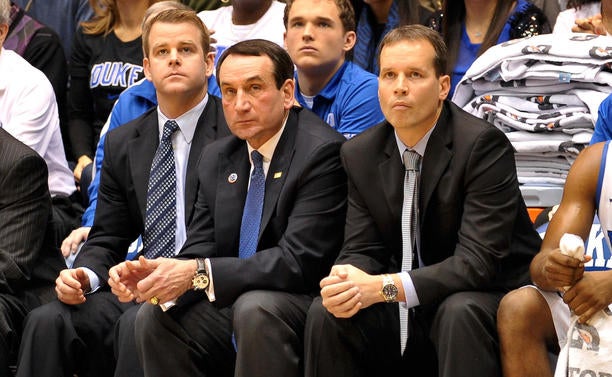
"Boeheim jokes about it because he'd end up get up and leaving and making me and Collins watch until 4 a.m. because we just beat Turkey by 60 points," Wojciechowski said. "'I'm not watching this game. You guys work for him.'"
Krzyzewski wants to watch for body language on the court and on the bench. He wants to see how his players and his opponents react to all the small things. He's looking for any and all edges. It's a constant hunt. Krzyzewski is always looking. Always.
"That's the most amazing thing about him," said Bilas, "the fact that all these years he's not lost his enthusiasm in the day-to-day grind for the job, which is what most older people do. He's still teaching. Most coaches as they age lose their taste for the grind of it and he has not lost that. He's still wired the same way and he feels like they are one mistake away from losing it."
There have been openings in the foundation over the years where K could have lost it. In 1987, after the class with Johnny Dawkins, Mark Alarie, Amaker and Bilas graduated, Duke made a Sweet 16 and set up the Christian Laettner/Grant Hill/Bobby Hurley era. Everything came crashing down in 1995. The year after that one was particularly important.
"In 1996, after the health scare, 10 games in they struggled," Bilas said. "I saw every game and it was going off the rails. Chris Collins hit a shot to win the game and if they lost, they might not have gotten it back. It was a shot that hit the heel of the rim, and if it bounces off, something crazy, you never know. It was a huge deal for the program to get them back on track. Brey had left, that was a big freaking year. If they had missed the tournament two years in a row it could've been a lot different."
Even earlier this year, Krzyzewski started but didn't finish coaching Duke's game against Wake Forest. He pushed it. He knew he did. His mind got the best of his body one more time.
"It's also gotten them in trouble at times," Scheyer said. "I mean, this year, he wore himself down a little bit. Missed a game and a half probably due to care, whatever you want to call it, exhaustion. That was legit. But that's what I think it is."
Krzyzewski's kept physically and mentally sharp by walking his dog, riding his exercise bike in his office, even making sure to do occasional weightlifting. There is some balance to his life, but he's refused to ease up even to the very end. Now Duke's in the Final Four. Not a coincidence.
"When you see him, he looks tired," Bilas said. "It shows a little bit more now."
In recent weeks, the man has begun to give off a boyish enthusiasm once more. The finality of this season, the size of this tournament and the importance it has on every team he coaches, it's felt like that has impacted Krzyzewski in a positive way that perhaps he didn't even see coming. There's a symbiosis to Krzyzewski's prep. There's the video, but there's also the practice plan. This week, he's crafting up his final ones, more than 4,500 into his career. He writes a new one almost every night during the season.
"It's like having a religion," Krzyzewski said.
He takes out an 8x11 piece of paper that is specifically formatted. There is the practice plan number on it, the date and then a column for the time allotted for each drill. Longer lines are printed for descriptions for the drills. Assistant coaches receive a photocopy; Krzyzewski and Krzyzewski alone creates these practice plans. And everything is done by hand. It's meticulous, with personal notes. A one-page scouting report for offense and defense.
"It's in his distinct handwriting, never typed out, that comes from some of his military background and learning how to have a daily regimen," Wojciechowski said. "For all these years, and he did it with the Olympics as well. I don't think the casual observer realizes that can be so tedious, and it's not a computer thing with delete-delete-delete. If you screw up on a handwritten practice plan, Coach isn't the type to cross it out and write it a different-colored ink. It's, 'Man, I gotta start over.'"
Krzyzewski is tight in his process. Practice or game or film. It's a style that not only isn't for everyone, almost no other coach does it the way Krzyzewski does. The amount of discipline, energy and focus it takes to do it borders on sociopathy. As a player Wojciechowski saw the end of the end of the reel-to-reel era, then when he joined the staff at the end of the '90s it was an evolution from VHS to CDs to, eventually, digital to services like SportsCode. Wojciechowski described the film sessions as "a test of endurance." They were also rewarding experiences because they were hours-long problem-solving sessions. And it's not as though every minute was strictly dedicated to basketball. Krzyzewski had his objective, but things could also be loose. They'd talk about life just as they would a flare screen or failed box-out.
"It's like, intellectually, man, it's 3:30 a.m. and I probably should be sleeping right now, as most people are doing, but we're trying to solve a basketball Rubik's cube for whatever group is in front of us and some of that was pretty fun," Wojciechowski said.
Scheyer shared similar sentiments. Duke's next head coach has lived this life since joining the staff in 2014.
"I remember my first year, Coach would be watching film on the plane right after every game," he said. "If you're a few rows back, you're standing the whole flight, watching the film. The discipline to prepare the same way every game is, when I say it, I mean, we've watched, we've scouted exhibition games before. First game of the year, last game of the year, he prepares the same way. He has his method of writing notes and rewriting notes. After the game of watching film of our next opponent. We're gonna watch the next game that they played. At times you're thinking, All right, 2:30 in the morning, he's ready to go to sleep. Nope. 'We're going to watch Virginia-Virginia Tech from last week together.' It's, I would like to say, for the most part — there's probably been a couple of times where like, 'Alright, I'm sure we could get some rest here' — but I've enjoyed it in a weird way."
Said Brey: "It's what I respect about him that makes him great: he's thinking about it all the time. He can think about it 20 hours a day because he's only going to sleep four."
There's been a lightness and noticeable appreciation to Krzyzewski in the past few weeks as he's soaked in one more run through this glorious and unpredictable tournament. His yeoman-like, unrelenting dedication to the craft got him back to New Orleans and extended his career, at least, for one more game. In many ways it's surprising, but in many others it's not surprising whatsoever. A one-of-one career that was bolstered in bunkers and closed-off rooms, gnashing over the tape, completely giving up all of himself to the work.
The end is finally here. There are the closing days for Head Coach Mike Krzyzewski. He will not be wasting one second.













